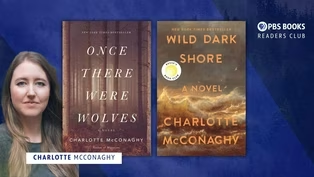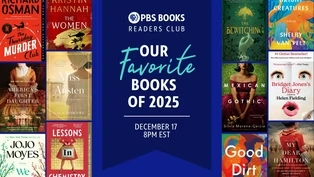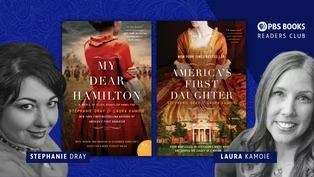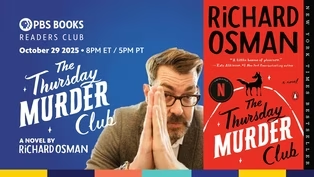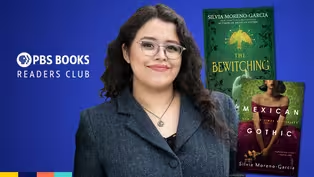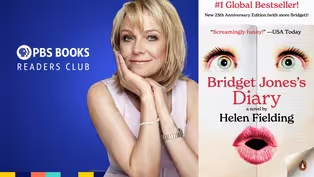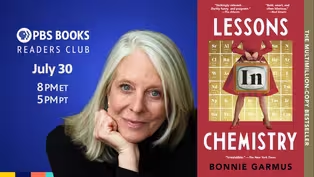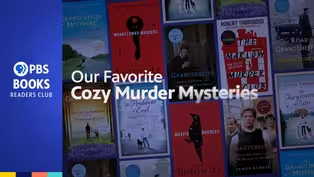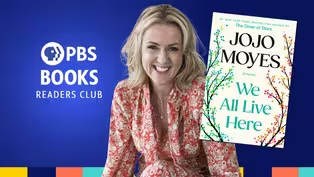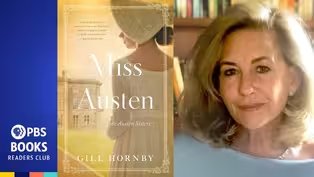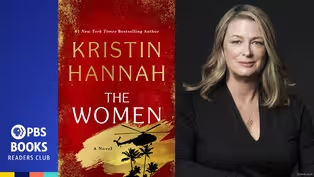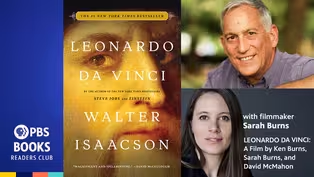
Readers Club | Leonardo Da Vinci
Season 2024 Episode 35 | 53m 9sVideo has Closed Captions
Readers Club welcomes Walter Isaacson and Sarah Burns to discuss Leonardo da Vinci documentary.
The PBS Books Readers Club Welcomes Renown Historian Walter Isaacson and Guest Sarah Burns, Co-Director/Writer of the new Ken Burns film, LEONARDO da VINCI debuting November on PBS.
Problems playing video? | Closed Captioning Feedback
Problems playing video? | Closed Captioning Feedback

Readers Club | Leonardo Da Vinci
Season 2024 Episode 35 | 53m 9sVideo has Closed Captions
The PBS Books Readers Club Welcomes Renown Historian Walter Isaacson and Guest Sarah Burns, Co-Director/Writer of the new Ken Burns film, LEONARDO da VINCI debuting November on PBS.
Problems playing video? | Closed Captioning Feedback
How to Watch PBS Books
PBS Books is available to stream on pbs.org and the free PBS App, available on iPhone, Apple TV, Android TV, Android smartphones, Amazon Fire TV, Amazon Fire Tablet, Roku, Samsung Smart TV, and Vizio.
Providing Support for PBS.org
Learn Moreabout PBS online sponsorshipMore from This Collection
The PBS Books Readers Club is a monthly digital-first series that brings its members into conversations behind the stories of your favorite books & shows. You can watch the online on the PBS App, with extended interviews available for PBS members on PBS Passport.
Readers Club | 302 Book Picks for Black History Month with Lauren Smith and Princess Weekes
Video has Closed Captions
PBBS Books Readers Club recommend their favorite Black History Month reads. (16m 16s)
Readers Club | Ep 301: Charlotte McConaghy | Once There Were Wolves
Video has Closed Captions
PBS Books Readers Club hosts author Charlotte McConaghy to discuss her novel Once There Were Wolves. (58m 55s)
Readers Club | Ep. 212: Our Favorite Books of 2025
Video has Closed Captions
PBS Books Readers Club celebrates the wrap of its second season with a highlight of 2025 (47m 55s)
Readers Club | Ep. 211: America's First Daughter | Stephanie Dray & Laura Kamoie
Video has Closed Captions
PBS Books Readers Club welcomes co-authors Stephanie Dray and Laura Kamoie (1h 1m 45s)
Wed Oct 29 2025 | Readers Club | Ep. 210: Richard Osman | Thursday Murder Club
Video has Closed Captions
PBS Books Readers Club welcomes celebrity writer Richard Osman to discuss his best-selling novel (52m 44s)
Readers Club | Ep. 209: Silvia Moreno-Garcia | The Bewitching and Mexican Gothic
Video has Closed Captions
PBS Books Readers Club welcomes award winning author Silvia Moreno-Garcia to discuss her new book. (52m 42s)
Readers Club | Ep. 208: Helen Fielding | Bridget Jones's Diary
Video has Closed Captions
PBS Books Readers Club welcomes beloved British author Helen Fielding to discuss her iconic novel (59m 30s)
Readers Club | Ep. 207: Lessons in Chemistry | Bonnie Garmus
Video has Closed Captions
PBS Books Readers Club welcomes international best-selling author Bonnie Garmus to discuss her novel (49m 3s)
Readers Club | Ep. 206: Our Favorite Cozy Murder Mysteries
Video has Closed Captions
PBS Books Readers Club hosts a special event sharing Our Favorite Cozy Murder Mysteries (52m 32s)
Readers Club | Ep. 205: We All Live Here | Jojo Moyes
Video has Closed Captions
PBS Books Readers Club welcomes international & New York Times best-selling author Jojo Moyes (57m 37s)
Readers Club | Ep. 204: Miss Austen | Gill Hornby
Video has Closed Captions
PBS Books Readers Club welcomes international best-selling author Gill Hornby to discuss her novel (51m 18s)
Readers Club | Ep. 203: The Women by Kristin Hannah
Video has Closed Captions
PBS Books Readers Club welcomes international best-selling author, Kristin Hannah to discuss novel. (53m 29s)
Providing Support for PBS.org
Learn Moreabout PBS online sponsorship(classic, upbeat music) - The idea for this film actually came from Walter Isaacson.
He suggested it to my dad.
And I think my dad's first instinct was, that's not really what we do.
We focus on American stories.
So, no, thank you.
And then he came to us and told us about it, and Dave and I were like, we should absolutely do Leonardo.
- Leonardo, if you go through his notebook pages, if you watch the wonderful documentary that Ken Burns and his team did, you'll see that he'd wake up each morning with questions in his mind, like, why is the sky blue?
Or, what does the tongue of a woodpecker look like?
I mean, who gets up in the morning and wants to know what a tongue of a, what do you do?
Get a woodpecker and open his mouth?
But that's Leonardo.
(classic music) - Well, hi, and welcome to the PBS Books Readers Club.
- Today we'll be joined by Walter Isaacson, esteemed biographer and author of this month's pick, "Leonardo da Vinci."
- Based on thousands of pages from Leonardo da Vinci's astonishing notebooks and new discoveries about his life and work, Walter Isaacson reveals an intimate portrait of Leonardo in a narrative that connects his art to his science.
- Isaacson shows how Leonardo's genius was based on skills we can improve in ourselves, such as passionate curiosity, careful observation, and an imagination so playful it flirted with fantasy.
- Yeah, I just, I love that guy.
This exciting biography tells an incredible story detailing Leonardo's ability to stand at the crossroads of the humanities and the sciences as one of history's most creative geniuses.
We're going to talk a little bit more about that word.
- It is the perfect pairing for streaming "Leonardo da Vinci," the latest PBS film by Ken Burns, Sarah Burns, and David McMahon.
Sarah Burns will also join us in a moment to discuss the making of this monumental documentary.
And PBS members can stream the Ken Burns Collection on PBS Passport right now.
Just $5 a month makes you a member of your PBS station, giving you access to PBS Passport and the PBS Books Readers Club mug.
(laughing) - And we are very excited to speak with the author, Walter Isaacson.
He'll be around with us as well, so stick around for that.
- I'm Fred Nahhat here with Lauren Smith, Princess Weekes, our award-winning video essayist and author who brings her Master's Degree in Literary Theory to our table, and of course, Heather-Marie Montilla, our resident librarian and the PBS Books National Director.
- But of course, the most important person in this book club is you.
As we discuss Leonardo da Vinci today, please share your thoughts with us and the other book clubbers in the comments.
It really means the world to us.
We love reading and responding to your comments in the chat.
And every time we see a little like or love float across the screen, truly, it makes us smile.
And it lets us know that you're enjoying the time you spend with us.
- Yeah, we love it.
And speaking of enjoying time in the company of other readers, be sure to join the PBS Books Readers Club Facebook group.
You'll find and share book recommendations and discuss your favorite reads anytime.
- And please share this event.
Do that right now.
As we always say, friends do not let friends miss out on great books.
And what's better than a book club with great friends?
- Well, nothing.
It's the best.
And we do say that all the time.
Now, before we get into the biography by Walter Isaacson, let's take a quick look at the PBS film on Leonardo da Vinci, another masterpiece from Ken Burns, Sarah Burns and David McMahon.
- He shows us something between what you see and what you don't see.
(intense music) - [Historian] This is the story of the most curious man in history.
- [Historian #2] The influence of Leonardo's vision was enormous.
- He's doing things no one had ever done before.
And that is simply astounding.
- The film is an incredible look at the 15th century Italian polymath of soaring imagination and profound intellect.
Heather, you had a chance to catch up with Sarah Burns, who co-directed the PBS documentary, "Leonardo da Vinci," with Ken Burns and David McMahon.
- She is amazing.
And I think to watch this video, the interview with her is phenomenal.
Because she talks about this book, and Walter is the reason why we now have a documentary film.
So, you'll get insights into that.
You'll hear she moved to Florence for a year, she'll talk about her experience.
And she even talks about how she got into the family business.
So, definitely a fun conversation.
- Let's take a look.
- Sarah, thank you so much for joining us today.
It is such a pleasure to have you with us.
- So great to be with you.
- Well, before we begin, can you share a little bit about your film?
- Yes, so this film is two parts, four hours.
As you said, it's a biography of Leonard da Vinci.
So, we're interested in his whole life, not just specific works, some very famous ones, of course, that are in there, but really understanding who he was, how his brain worked.
This is someone who was just such a fascinating, curious individual.
And we had the pleasure of spending more than three years just diving into this story and getting to know Leonardo and trying to figure out how to tell his story, how to let people in to understanding something about the way this extraordinary mind works.
Worked.
- What inspired you to create the film that focused on Leonardo da Vinci?
- Well, this project is different for us.
All of our past films have been, and my dad's films for many decades, have all focused on American history.
And so this is really unusual for us, something quite different.
And it also is a story set much further in the past than we're used to in many cases.
Our last film, the last film that I worked on, was a biography of Muhammad Ali.
So, we had loads of footage and photographs to tell the story.
That was very different in this case.
But the idea for this film actually came from Walter Isaacson, who was then working on his biography of Leonardo that I see behind you.
And he suggested it to my dad.
You know, he's working on it and he's like, this is just such a terrific story.
And I think my dad's first instinct was, that's not really what we do.
We focus on American stories.
So, no, thank you.
And then he came to us and told us about it, and Dave and I were like, we should absolutely do Leonardo.
It's different, it's a real challenge, because of, as I mentioned, the lack of visual, the kinds of visual materials that we so often rely on to tell stories.
And we felt like this was both an incredibly fascinating character who we would love to get to know more about.
That's always what these are.
We're learning it as we go.
And so this was someone we would love to learn more about.
And it was this amazing challenge and therefore opportunity to think about how to tell a story in a different way without the same kinds of materials that we usually use.
And I think that was really liberating in a lot of ways, too, to change our style.
- So, how did you start your research process then?
- We really always start by reading a lot.
That's the beginning, always.
We want to get to know Leonardo.
We're never going to become experts in the way that, you know, the art historians who have studied Leonardo for many decades are experts.
But we want to rely on that work, the work of Walter and other biographers, on the art historians who have written and studied extensively Leonardo's life and works.
And then also on other people who have interesting perspectives on Leonardo.
So, we start by reading, we end up interviewing and filming some of these people, any of them, the biographers, the art historians, and also folks who have an interest in Leonardo coming from some other direction.
So in the film we have a heart surgeon who studied his anatomical drawings.
We have an aerospace engineer who has looked at some of his research on gravity and aerodynamics and bird flight because we want to hear from people who have different kinds of perspectives on Leonardo.
The filmmaker, Guillermo del Toro, is in our film for that same reason.
- In this journey, did you find something that really stuck out to you as one of your favorites?
Whether it was an artistic endeavor or scientific?
- Yeah, I mean, there are so many things.
Maybe I'll take one of each.
I really loved when we, you know, we went and filmed many of the paintings in person.
There are, you know, reproductions, you know, high quality scans or photographs that we could use, and did in some cases in the film, to depict the paintings.
But we really found that bringing our cinematographer Buddy Squires and actually being there with the painting and capturing it with our camera and moving around within it and getting very close up just gave us an even better ability to really feel the texture of the paint, and to get kind of close to those paintings and capture the color of them as authentically as possible.
And so we did that for quite a few.
And the Louvre, which has more Leonardo paintings than any other institution, and they did an exhibition in 2019, 2020, around the 500th anniversary of Leonardo's death where they collected many of his works that are held elsewhere and brought together a big exhibition that was really incredible.
And they let us go in there.
They let us in overnight to film by ourselves in this exhibition, which was a really extraordinary experience that I will not soon forget.
But standing in front of Leonardo's St. Anne, The Virgin and Child with Saint Anne, which was restored maybe a decade ago, and just the colors are so vibrant and it's such an extraordinary painting.
It's one, like the Mona Lisa, that he kept with him and kept working on until the end of his life.
So, it's something that became like that, a kind of experiment and really was a culmination of all of his different investigations and sort of scientific studies kind of poured onto the canvas.
I think the same could be said of the Mona Lisa as well.
But for me, just standing in front of that painting and experiencing that was really extraordinary.
In terms of the scientific stuff, and again, for him, these are all the same, right?
He's not distinguishing science and art at all the way we might today, but I loved his study of gravity and trying to understand the gravitational constant, which this engineer, Morteza Gharib, explains in the film.
And for me, just trying to wrap my head around what he was studying, how he was looking at this idea, and getting within fairly close to the actual gravitational consonant of Earth in this time when he had none of the tools that we have today to figure that out.
I mean, he literally was taking a vase filled with sand and pouring the sand out while moving the vase to try to match the acceleration of gravity by, I mean, it's a really extraordinary thing that he's figuring out with pretty minimal tools.
I mean, not even a clock, let alone a stopwatch, right?
Or a slow-motion camera, or I mean, or calculus, you know, like, there's just a lot that he did not have access to.
And so that to me was this most extraordinary example of what he was able to do just with his eyes and his mind that's really amazing.
- All of that is so incredible.
And you've talked a lot about his notebooks and that we know less about his personal life.
It's kind of a bit of a mystery.
What was one of the most interesting things that you did learn about Da Vinci and his personal life as you researched the film?
- Yeah, so there are a few things, right?
They're few and far between, but you can occasionally get these kind of hints at something about his personal life.
Some of that comes from his contemporaries who wrote about him.
And the thing you learn there that's maybe a little surprising because I think we tend to imagine kind of a tortured artist type when we don't know otherwise, is that he was fun.
That he was, you know, he had friends, he liked to play music and sing, and you know, that this is someone you would want to invite to your, you know, hypothetical dinner party.
That he was not a kind of solitary person.
He was someone who was engaged with his peers, these intellectual conversations and artistic conversations, and fun.
And so, that's one thing I loved to learn.
And we talked about from the very beginning how we could, in this portrait of him, try to rip the beard off, to not just portray him as the old man wizard from those portraits, but who was this?
Who was he as a young man?
As a child?
How can we try to get to know him better in that way?
And so that was sort of a fun part of this, was trying to uncover some of those other layers.
There's also aspects where he does write a little bit, occasionally, you can sort of read between the lines.
And one really interesting one is, so, there was a boy, a young boy, who came into his studio initially as an apprentice, an assistant who ended up with the nickname Salaì, which means little devil because he was such a troublemaker.
And so Leonardo wrote at some point these sort of complaints about him.
He stole this thing from this other artist, and you know, I was making the shirts for him and he took the money.
And you know, he is sort of constantly causing trouble as this young, you know, adolescent who comes into Leonardo's sort of studio.
But he becomes, eventually, he stays with Leonardo for many years as an assistant and then apprentice.
And then it seems clear as a kind of partner, companion, probably lover later, many years into his life.
And so it's this really interesting thing, this, you know, this person who as a boy was this kind of troublemaker, but eventually becomes such an important part of Leonardo's life years later.
And so we do get little glimpses here and there of how he feels about people.
- Well, as we speak about family, it seems that you are a filmmaker, which is the family business.
Can you talk a little bit about, did you always know you wanted to be a filmmaker and at what point did you start participating in the family business?
- Yeah, it definitely is.
My mom was a documentary filmmaker.
Also, my uncle.
It's really, truly a family business.
I was not always sure I wanted to be a documentary filmmaker.
I very much grew up with it.
I mean, it was literally in my house growing up.
There's a photo of me at, you know, one and a half standing on a chair up above a Steenbeck editing table pretending to splice film, you know, so it was there.
I used to go to the screening sometimes and give my comments when I was, you know, nine, 10 years old.
And the Baseball series, I remember very well, sitting through those consultant screenings and listening to everyone talk about it.
But for me it was about a story that was meaningful to me, the way I sort of came into the family business.
So for me, that was a story of the Central Park Five, and that was something that I wrote about as an undergraduate, and then I wrote a book about that case and those wrongful convictions in that case.
And that was when, as I was working on the book, that it became very clear to us, my dad and Dave, my husband, that we wanted to make a film about it.
And that documentary was a great medium and way to tell that story, which was still very misunderstood and kind of unknown.
And that the ability in film to interview our subjects of this story, these five men who had been wrongly convicted, and give them a platform to tell their own story in a way that the book could not was really meaningful.
And so for me, that was how I came into this business of documentary filmmaking was that I had this story that I felt needed to be told.
And so that was an amazing experience where I learned so much about the filmmaking process, but was able to bring sort of my knowledge of this story and got hooked.
Love the collaborative nature of it, working as a team, not just with other directors, but with our editors, with our production research team, our cinematographer, and just shaping a story with all of these people, and everyone has their own ideas and thoughts and brings something else to it.
I love that.
So, writing a book was hard.
I'm glad I did it.
It was an amazing experience.
But I really loved the process and the way that we make these films.
It's a great thing to get to do.
- Well, we feel very lucky that you chose film because this is an incredible film, as are many of your other works.
And as we close this conversation, just, what would you like your viewers to take away from watching this docuseries?
- Well, I think, I hope people take away, I think it's what I take away from having spent all this time with Leonardo and learned from Leonardo, is really how we should embrace the ways that I think we can be more like him with his curiosity and his just, awe of the world.
The way that he would go out and just look closely at everything and kind of take it in in this way that I think we don't always remember to do that today.
There are so many distractions in technology and everywhere, but that if we could bring our attention a little bit to the world around us and the people around us the way that Leonardo did, I think we would all be doing a good thing.
- Well, Sarah, thank you so very much for this conversation.
Thank you for your work and thank you for your insights.
It's been really wonderful.
- Thank you for having me.
- Amazing.
- Nice work, Heather.
- Well, it was my honor.
She's so much fun.
- Yeah, she's so great.
And it's always fascinating to take a look behind the scenes at the making of our favorite PBS films, as well as between the pages of our favorite books.
So, let's talk about our PBS Books Readers Club Pick this month, "Leonardo da Vinci" by Walter Isaacson.
Book friends, what were your thoughts?
- I found it to be, I love biographies, and I found it so fascinating because you hear the name Leonardo da Vinci and you think that's who he was.
And there was so much just like, nuance and insight to him.
And also just, you know, I think it's always fun to realize how many queer people existed in history and were just like, living their lives, just being talented and interesting.
And it was just fine.
It's just fine.
Just being a hot guy, doing hot boy things.
- Okay, well, I studied art history in undergrad as one of my majors, so, I always tell people and kid around that it's because I like picture books.
And this will not disappoint, right?
There are pictures throughout and I really appreciated that, how Isaacson connected the image and you really needed to see the image.
I mean, I think I like the audiobook, but I needed to read the book in my hands to be able to see those amazing images.
And he really goes after it, really thinking about the big takeaways, what we can learn today, and how we can even apply it 500, 400 years, 500 years later.
- Yeah.
- Yeah.
- Well, it was incredible.
And to your point, da Vinci was living his best life.
- Absolutely.
- I mean, in ways that, you know, we struggle to today.
I'm not sure his collective persona and his collective talent and ability could exist in our world.
It was a confluence of everything.
And to think he considered breathing, anatomy, dentistry.
- The tongue of the woodpecker.
- Buttressing a cathedral.
But it had to be in Firenze.
Or if it was in Milan, then it was like Florence, because he was a Florentine true and true.
- Yeah.
- Just the idea of like, being in your thirties, and being like, yeah, I'll just send you my resume.
Like, and I can also paint, too, here's the evidence.
And like, how good for those humanity majors back then where you'll just be like, here's my stuff, patron me.
- You could see my book.
Okay, so my book, it is like, torn asunder and it's because of the pictures.
And for whatever reason, my children were obsessed with this book.
They are three and six, so it's not like they're engaging with the biography, but something about the art was really moving.
And I have to admit, I was one of those people that before I read this book, I didn't really get it.
Like, I saw the Mona Lisa and I was kind of like, meh, you know?
- It's small.
- Yeah.
It's because I was ignorant.
And now after having read this, I appreciate it so much more.
And I just love that about reading in general when you learn something new and it like, it's impacted my memories.
And now I want to go back and see the Mona Lisa again because I feel like I can appreciate everything that went into it.
Well, so much to discuss with Walter Isaacson standing by to join us in just a moment.
And we want to invite you to join the PBS Books Readers Club, too.
Tell us what you thought about "Leonardo da Vinci" and maybe pose a question or two for other book clubbers to react to.
- [Lauren] Like any good book club, it's more fun when we all get involved.
And there are many ways to connect, including our e-newsletter.
You'll find exclusive author interviews, book recommendations, and more.
Visit PBSBooks.org/subscribe.
- [Fred] And as always, be sure to follow PBS Books on Facebook and Instagram, too.
And fill up your feed with great books and great authors.
- And if you really love this PBS Book Club, I hope you'll take a moment to show your support.
PBS stations and this book club rely on donations from folks like you and me.
And if you'd like to see more of the PBS Books Readers Club, here's a great way for you to help keep us going.
If you're watching on Facebook or YouTube, just click the link in the comments or description, or visit PBSBooks.org/donate.
You'll be taken to your local PBS station's Giving Webpage where you can find some PBS Books swag as our thanks for supporting this program.
One of those gifts is an ebook download of "Leonardo da Vinci" or any of our PBS Books features, for your phone, tablet, or e-reader.
After you make your donation, you'll receive an email with a link and a special code to download one of our featured books.
- Or you can get one of our official PBS Books mugs, just $5 a month.
We'll get you the PBS Books mug and it makes you a member of your local PBS station, giving you access to all the amazing shows and Passport, including the extended edition of this interview with Walter Isaacson and the entire Ken Burns Collection.
- So if you want to see more of the PBS Books Readers Club, we've got to hear from you.
Just click the link in the description or visit PBSBooks.org/donate.
We'll send you a set of the official PBS Books stickers, too, along with your ebook or mug.
Again, donate and support your local PBS station, and it will help us keep this book club going for another month.
- And now let us welcome in our guest, Walter Isaacson.
He's the bestselling author of biographies of Jennifer Doudna, Steve Jobs, Benjamin Franklin, Albert Einstein, and of course, Leonardo da Vinci.
He is a Professor of History at Tulane University, was CEO of the Aspen Institute, Chair of CNN and Editor of Time, and he was awarded the National Humanities Medal in 2023.
Walter Isaacson, welcome to the PBS Books Readers Club.
- Thanks.
Thanks for having me.
It's a great honor.
- Well, thank you so much for joining us and for this incredible work, "Leonardo da Vinci."
Why did you decide to write this biography?
Why Leonardo?
- I had written biographies of people like Einstein and Ben Franklin, and they were people who tried to know everything you could possibly know about everything in the world that was knowable.
And the person who probably best represented that in history, the Renaissance man incarnate, of course, is Leonardo da Vinci.
He loves music and math.
He loves science and art.
And that ability to see across disciplines is what made him, I think, the most influential mind in history, almost.
- Now you've been curious at chronicling the lives of those we consider to be geniuses.
Einstein, Jobs, Benjamin Franklin, Doudna, Musk.
What do you think connects them?
What do they have in common?
- I'd start with Leonardo to say, it begins with just pure curiosity.
Curiosity for its own sake.
Leonardo, if you go through his notebook pages, if you watch the wonderful documentary that Ken Burns and his team did, you'll see that he'd wake up each morning with questions in his mind like, why is the sky blue?
Or, what does the tongue of a woodpecker look like?
I mean, who gets up in the morning and wants to know what a tongue of a, what do you do?
Get a woodpecker and open his mouth?
But that's Leonardo.
And that curiosity drove him.
And I realized it was the same curiosity I saw in Einstein's notebook.
Einstein also put, why is the sky blue?
They both do experiments to try to figure out why the sky is blue.
Einstein once said he was not the smartest scientist of his time he was only the most curious.
Well, it's not actually true, he was the smartest, but he was also definitely the most curious.
And that's what links people like Leonardo da Vinci, Jennifer Doudna, Einstein and Ben Franklin.
- I've heard that you actually approached Ken Burns and suggested to do a documentary on Leonardo.
Is this true?
- Yeah, we were in Washington having dinner in Georgetown and I had worked with him on Ben Franklin.
I'd worked with him on many other things and he had mainly done Americans, but his company was named Florentine Films.
And I said, if you want to do the person who most represents what we could all aspire to be, which is curious about everything around us, yeah, you'd want to do Leonardo da Vinci.
And he sort of pushed back.
At first he said, well, you know, he's not an American.
And then I said, he sets the groundwork for all of what civilization became.
And Ken decided, okay, let's do it.
- I read a book recently that kept popping into my mind while I was reading about Leonardo.
It was called "Range" by David Epstein.
And the hypothesis was essentially that exploring many different things, whether it's multiple sports, multiple instruments, multiple interests, versus specializing and dedicating all of your time to just one thing actually makes you better at whatever that special thing is that you're trying to do.
It seems like Leonardo might be the very best example of that.
- Absolutely.
It's a great question, and the book "Range" is a very good one because if you're able to be interested in all sorts of fields, you get to see patterns across nature.
My students at Tulane University, their parents say, okay, we want you to learn coding.
And I say, what happens in five years where we don't need the skill of coding because machines do it for us?
I say, what you need is range.
You need to be able to be curious about everything there is.
And that way you can be flexible.
Your mind can leap around.
Leonardo da Vinci is the best example of that.
When he saw swirls of water, it helped him paint the water in The Baptism of Christ going past the ankles of Jesus.
But it also helped him do the curls of the Mona Lisa.
And it helped him understand the mathematics of Fibonacci's equation, or what became Fibonacci's equation.
So that ability to tie things together, that range, as you put it, is what sets Leonardo apart.
But the cool thing is it doesn't have to set him apart.
All of us can try to learn everything we can about many different fields.
- You know, I'm always curious about process, and this book, it is very clear that there's so much research that you've conducted in writing this book.
Can you share a little bit about your research process?
- The wonderful thing about Leonardo da Vinci is that he leaves us about 7,200 pages of notebooks.
That's more than I had with Steve Jobs.
That's more, you know, than you have with most people.
And they're scattered all over the world.
Nobody's ever fully collected them.
And they're in Florence and they're in Milan, they're in Paris in the Louvre, they're at Windsor Castle.
And I thought, well, that's going to be wonderful.
I get to travel to all these really cool places and just go page by page through his notebooks, watching as his mind dances across nature.
So, the fundamental approach I took in this book is just start by reading every day's notebook, reading everything he wrote in those notebooks, and then trying to recreate the beauty of his mind dancing with different topics.
- You know, to me, professor, you're one of our historical superheroes along with Ken Burns and Eddie Glaude, John Meacham, so many others, bringing history to life.
Why do you think it's so important to reconsider history and historical figures of note?
And given the self-centeredness of today's media, TikTok, celebrity memoirs, are you hopeful that future generations will continue to pursue historic and scholarly works?
- You know, history is fun and wonderful and filled with tales, but it's also filled with the tales that define who we are.
We get inspired by the people in history, we learn our values and our beliefs through history.
And you know, in some ways, that's the way the Bible approaches it, within the beginning, and Adam and Eve.
Now, that may not be to some people exact history, but it's a storytelling that brings us our values.
And so as we look at what's happening in the United States now, it's useful to see how Ben Franklin understood how different people of different faiths and different backgrounds could work together as a nation.
Likewise, as we see things like science being denigrated, it's useful to just marvel at the curiosity of Leonardo da Vinci and to be inspired by him.
- Absolutely.
To build off of Heather's question, one of the things I found so interesting is realizing how little that I had learned about Leonardo's personal life and his younger life, and him being this young, attractive, fun guy hanging about.
How did you go about finding the little bit of resources we had about his youth?
I know you mentioned some of it in the book.
And what did you find interesting about his younger years while you were researching the work?
- One of the interesting things about creative people is to some extent they're misfits.
They don't fit in all that well.
Whether it's Einstein growing up Jewish in Germany in the early 1900s, or you know, Steve Jobs being adopted by a working class family and not feeling like he fit in.
And with Leonardo, that's especially true.
As a very young kid, he was born out of wedlock.
His father doesn't legitimate him so he's an illegitimate son.
He's left-handed, he's distracted, he's gay, and yet he tries to fit in, leaving the village of Vinci and going to the wonderful town of Florence where they embrace him.
And so he's both an outsider and a bit of a misfit, and yet somebody who knows he can succeed in this world.
And I think that has a lot of lessons for everybody.
Almost all of us who felt like misfits at times.
How do you harness that in order to be creative rather than being defeated by that?
- There is so much that you've included in this book about Leonardo.
What was the most challenging aspect of writing Leonardo's complex legacy in your book?
- I don't know that there was anything all that hard because it was all wonderful and exciting.
There are a few questions about Leonardo that I struggled to answer, which is, why didn't he finish most of his paintings?
Why did he leave so much unaccomplished?
Was it because he was a perfectionist?
Was it because he was easily distracted?
But by the end of the book, I began to see the patterns and that notion of being distracted is also what gave him his strength.
He would move from looking at flying machines and how to replicate them, to doing a study of how birds fly, and then doing beautiful paintings.
And so I found that, because I had all of his notebooks that I could look at, I got to understand him pretty well.
- One of the things that stuck with me towards the very beginning of the book was you talked about the dangers of calling someone like Leonardo a genius and taking the humanity out of his accomplishments.
I would love to just dive more into this, like, what do you think are the dangers of that, and just more about that adjective genius.
Like, what do we mean and what should we mean if we call someone that?
- You know, when we call somebody a genius, we usually mean they're very, very smart.
But smart people are a dime a dozen.
That doesn't make you a genius.
What makes you a genius is being able to think out of the box, to think different, to come up with a whole new way of questioning whether there was a biblical flood, or how birds fly, or what the tongue of a woodpecker may look like.
You know, thinking out of the box, which is what, or as Steve Jobs would say, think different.
I think the problem I had with some biographers who just slapped the word genius on Leonardo is it makes it seem like he was touched by the gods with something special, and he was totally different from us and that it was this very special quality of genius that he was born with.
But no, Leonardo's creativity, his genius, so to speak, was something he worked on.
He did by himself.
He tried to study everything.
He tried to perfect everything he touched.
So, it was a product, not of some gift by the gods, but of human will and human effort.
And I don't think we want to minimize Leonardo's genius by just making it seem like it was bestowed upon him as opposed to he had to work for it.
- So, for the rest of us that maybe don't consider ourselves to be geniuses, what can the average person take away and learn from Leonardo da Vinci?
Are there certain skills that we can all improve in ourselves?
- Well, go back to the skill I started with, which is curiosity.
You know, we're all curious as kids.
We all go walking around saying, why is the sky blue?
Or, how does a butterfly do this?
And eventually it gets knocked out of us by grownups who say quit asking so many stupid questions.
I think that we can all pause each day.
I mean, I'm looking out now of my window, the sky is a deep blue.
And I should be pausing and wondering what makes us, and by the way, any of us can figure that out now.
You can just Google it and it'll explain, why is the sky blue?
And I'm looking at the wind and the ripples.
There's a hurricane in the Gulf.
And wondering, you know, on the river, why do the ripples move in a different direction than the wind?
These are pure things that I try seven times a day, I almost count them, you say, okay, pause for a moment.
Why is the light glinting off that leaf the way it does?
Or, why is the sky blue?
And I think that leads to another trait, which is being observant.
Meaning Leonardo would watch the birds and say, which type of birds do the wings go up faster?
And which type of birds do the wings go down faster when they fly?
And those are things we could all, if we tried hard enough, be more observant and more curious.
- Well, it's funny that you mention the childlike wonder because you can see my copy of your book is torn asunder because my children really enjoyed going through it.
After studying Leonardo, have you changed anything about the way that you learn in work?
- Yeah, I mean, two or three things.
I've tried to convince myself I can learn anything.
Like, you know, we all have things we're afraid of learning.
Maybe it's math.
It's like, okay, if I work, I mean, I'm never going to do tensor calculus the way Einstein did, but if I want to understand what Einstein did, if I work at it, I can.
And if I want to understand Lord Byron's poetry, I can work at it.
If I want to learn French, I can do it.
So I try in life not to say, I don't understand that, or I could never do French or math or poetry.
I try to say I can learn anything.
- Walter, did you always know you were going to be a writer or is it something that occurred to you later in life?
- Oh, I think it was around age 12 or so.
When I was growing up, there was a uncle of friends of mine or whatever and we'd go across from New Orleans to the Bogue Falaya river and we'd go fishing and hunting and catching turtles and water skiing.
And we never quite knew, Ann, was her name, what does your dad do?
He's always sitting on the dock eating hogshead cheese and drinking bourbon.
What does your dad do?
And she said, well, he's a writer.
And up until then, I knew you could be an engineer like my father, or be a fisherman, or be a doctor.
I didn't know you could just be a writer.
And so I started asking, you know, the writer was named Walker Percy.
He's a pretty famous, was a pretty famous novelist back then.
And he said, yeah, there are two types of people who come out of Louisiana, preachers and storytellers.
And he said, for heaven's sake, be a storyteller.
The world has too many preachers.
And so I began to believe that being a good storyteller, telling the history of our time through the people who made it, is a worthy enough endeavor.
It's fun to do and it helps inspire people and understand what our values are.
- What's your ideal writing setup?
Are you a morning person?
Night owl?
Do you like to work in an office, in a coffee shop, or do you mix it up?
- I'm a night person.
I don't believe anything good ever happens before 10 in the morning.
And I work sometimes from 9:00 at night till 2:00 in the morning.
- Aw, you found your spirit.
- I know everybody's like, a morning person, I'm just like, I don't think well before noon.
- And I did the work in a library, in my own home library.
My writing work has changed over the years because when I was telling you about Leonardo da Vinci, I had to go around the world to look at his notebook pages.
But nowadays, most things are accessible online, so you don't have to go to archives as much.
On the other hand, for a lot of my books, whether it's Steve Jobs, Jennifer Doudna, or Elon Musk, I like to do what journalists sometimes don't do much these days, is go out and report.
Spend a whole lot of time just watching the subject and taking notes.
And so, if I'm writing a book about a living person, I'll spend a year or two just by their side, you know, reporting what they're doing.
And then a year or two of writing it up.
If it's somebody in history, I can now go online, and get most of their papers in archives.
- Well, then, when you're reading, do you still prefer physical books or do you also enjoy e-readers or audio books or some mixture of all three?
- I think that I have now mainly gone to e-reading.
I even read on my iPhone, books on my iPhone.
I know that sounds hard to do, but it's actually not.
I have a Kindle app on my iPhone.
And I read on my computer.
As you can tell, I have enormous numbers of physical books, you know, in my library in my house.
And sometimes I curl up with one.
But I've gotten more and more used to reading electronically.
- What was a favorite book from your childhood?
- Well, I talked about Walker Percy.
And when I first, you know, he told me he was a writer, and I didn't know quite what that meant.
I went and I got "The Moviegoer," which is a wonderful novel about, you know, a person in their thirties, a guy who's on a search, trying to kind of figure out what's the meaning of all of this.
And it was a slightly difficult book for a 12-year-old to read, or maybe I was 14 by then, but it became my favorite book and I try to reread it every few years.
- That's awesome.
Do you have any favorite books that you've read in the last year?
- I read "Klara and The Sun" by Ishiguro, which is about sort of robot AI caregivers.
That's a book I liked and I tend to read a lot of nonfiction.
I just finished Ta-Nehisi Coates' book and Malcolm Gladwell's.
- What's the best advice you've ever received?
- Well, I think I gave it with Walker Percy, which is, you can be a preacher or a storyteller, but the world's got too many preachers.
I do think that's true.
Whether it be in journalism or on TV or online, everybody's preaching.
Everybody's giving you a hot take.
And to me it's like, all right, let me go out.
Let me figure out what this person, Jennifer Doudna, Elon Musk, Steve Jobs, what they're doing.
And let me tell you the story and you can draw your own lessons.
But I'm not there to be a preacher.
I'm there to be the storyteller.
- Now, is that what you would also give to aspiring writers or is there another line of advice you'd provide?
- Yeah, I would say try to figure out how to be a good storyteller.
And that means narrative.
Which means, you begin in your head by saying, let me tell you a story.
And you tell a chronological story like you would at dinner with friends, like the day we went out fishing, and here's what we did.
And it began that morning when this, and try to make tales chronological.
Second is to try to be curious about everything.
Don't, as we said earlier on in the show, don't always specialize.
Be like Leonardo da Vinci.
Be interested in the flight of birds, but also the flow of rivers and also the smile of the Mona Lisa.
And I think that if you pursue curiosity for its own sake, where you're not just being curious about something because it may lead to a, you know, something that'd be useful for you, curiosity for its own sake sometimes becomes its own reward and good things come from it.
I guess one more piece of advice I'd give is that everybody I've written about, it turned out to be not just about their passion, but about connecting their passion to something larger than themselves.
Whether it's Elon Musk trying to get to Mars, or Leonardo da Vinci, you know, trying to connect science and the humanities, or square the circle and make the perfect smile, or Einstein trying to unite all the forces in the universe, they all felt like they were driven by a mission, not simply driven by making money.
- Finally, anything that you'd like to say to your readers?
- Well, I think it's important that we understand the beauty and the complexity of human beings.
In this day and age, I think we feel that we have to call somebody a hero or a villain, or right or wrong, in 140 characters or in 20-second sound bites on a cable news show.
But Shakespeare teaches us that everybody's complex.
Even our greatest heroes have dark strands, you know?
Henry the V could lead us to the Battle of Agincourt, but then he kills all the French prisoners.
And even our villains, Iago, Shylock, they have their own backstories.
So, we're too quick to judge and render 140-character hot take judgements on people, and we don't appreciate the complexity.
Leonardo's a complex person.
He's depressed, he's dark, he's an outsider, he's jubilant, he has friends, he's got many things, and he is able to combine all that so that he's not a perfect person.
Steve Jobs wasn't perfect.
God knows Elon Musk isn't perfect.
Even Ben Franklin had some flaws.
But we should understand people in total rather than being totally judgmental from the beginning.
- Well, Walter Isaacson, thank you so much for joining us on the PBS Books Readers Club.
We sure appreciate it.
- Thank you for having me.
I appreciate it.
- What'd you think?
- Well, I thought that was amazing.
So insightful, and I mean, this is a work of art in itself, right?
And I don't think I've ever read anything that made me appreciate art as much as this did.
I learned a lot.
I'm not an art history major like some of us, but I learned a lot.
- Well, for me it kind of explains so much.
I mean, in the beginning it kind of talks about, well, he's one of many Florentines, right?
And then you're like, but then it delves into everything he did and what made him so unique and so different and how he was so curious of everything.
Like, and even in the interview how Walter spoke about the curiosity.
And that's one of the most important things.
It kind of, for me to walk away, that's my walk-away, to be more curious about life.
- Absolutely.
I'm glad to finally have another night owl.
- Yeah, I was going to say.
- I'm like, I was starting to feel a complex about it.
But no, I felt like Professor Isaacson, he was just so thoughtful.
And I think the reason I love history is for all the things he said, the things that you learn from it, the way that you connect everything to it.
And that it does encourage you to be curious.
And I think that, even as you mentioned, with like TikTok and the internet, while it can be a hole that you can sink into and get misinformation, it can also be an access point if you are curious.
And so just a reminder to like, seek out information for yourself, and I think this book is a great reminder of what happens when you do that.
- Listen to your library.
- Yeah, exactly.
- Fall into that rabbit hole, for sure.
- Well, really interesting page by page by page.
Now he of course mentions curiosity, but as a professor, as a historian, as a writer, talking about biographies of people who are alive versus people who have passed away, those who have passed away, how he brings them to life in such an easy manner with such a complex subject.
That to me is a singular talent.
That's why you need to get into this book because it really is, pardon the phrase, enlightening.
- And it does have pictures, so that makes it more fun.
- And for those who listen to audio books, Alfred Molina, AKA Doc Ock from Spider-Man 2, does the audio book and like, he's phenomenal.
So, if you need to have that, you can read along and look at the pictures and listen, too.
- Yes.
You have to look at the pictures, though.
- There's a PDF file in the audio book.
- There is.
But it doesn't replace the book.
- [Fred] Really amazing.
All right, if you haven't read "Leonardo da Vinci" yet, you can pick up copies at your local library or bookstore or download the ebook when you support your local PBS station.
- [Lauren] And stream the film by Ken Burns, Sarah Burns, and David McMahon with the PBS App.
Remember that as a member of your local station, you can also unlock PBS Passport, the members only section of the PBS App, where you'll find the Ken Burns Collection along with so many other PBS favorites.
- Yeah, just $5 a month makes you a member of your local PBS station, giving you access to full seasons of Masterpiece in Passport.
And you can also access the extended edition of this interview with Walter Isaacson and other episodes of the PBS Books Readers Club.
- And get yourself the PBS Books mug.
How cute is that?
My weekend is booked.
Or, with a sustaining gift of $10 monthly, you can download your ebook of "Leonardo da Vinci" or any of our featured reads.
Just click the link in the description or visit PBSBooks.org/donate and you'll be taken right to your local PBS station's Giving Page.
After you complete your donation, you'll get an email from your station with a special code to download your ebook.
- [Fred] Now, every station's donation page is a little different, so you may need to search a little bit to find the PBS Books gifts.
But stick with us, because your support makes this Reader's Club possible.
- And everyone can help by sharing this video.
Tell all your friends.
The more the merrier, right?
And definitely leave us a comment.
We want to know your thoughts.
Like the video, love the video.
And if you're watching on YouTube, be sure to subscribe.
Do that right now.
Truly, your comments, shares, and participation mean the world to us.
So, thank you so much.
- In our next Book Club gathering, we're going to celebrate an incredible year of reading and share some of our favorite books of the year.
- You won't want to miss this one.
RSVP to our Facebook Live event right now.
It's happening December 11th at 8:00 PM, just in time to get your book gift list in order.
Or you can subscribe to our YouTube channel so you can catch the episode there.
- [Princess] We'll also have more book recommendations in the PBS books e-newsletter.
Visit PBSBooks.org/subscribe.
- We're so glad to have you as part of the PBS Books Readers Club.
If you love this conversation, please consider making a donation to your local PBS station so we can keep our book club going.
Click the link in the description or visit PBSBooks.org/donate.
- [Lauren] Remember, you can get your very own PBS Books mug, there it is, along with PBS Book stickers for your laptop, phone, or whatever you'd like to show off your love for books and for PBS.
And you can get an ebook download of one of our PBS Books features.
We do have "Leonardo da Vinci" the ebook available.
So, if you make your donation right now, you can go download it as soon as you get the email with your special code.
- And everyone can help by sharing this video with all your friends, giving us a like or a love, exactly, and subscribing to the, all the heart signs across all generations, and subscribing to the PBS Books e-newsletter at PBSBooks.org/subscribe.
- Thanks for reading along with the PBS Books Readers Club.
(classic, upbeat music)
Extended Readers Club | Leonardo Da Vinci
Video has Closed Captions
Clip: S2024 Ep35 | 1h 18m 49s | Readers Club welcomes Walter Isaacson and Sarah Burns to discuss Leonardo da Vinci documentary. (1h 18m 49s)
Providing Support for PBS.org
Learn Moreabout PBS online sponsorshipSupport for PBS provided by:

